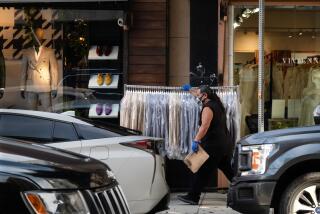Foreign Dressmaker Has Spotty Record
- Share via
Question: A couple of months ago, I had a relative visiting me from Europe. She had a dress that cost about $400 and which she had cleaned locally. The dress was black with green dots on it. When the dress was brought in, the owner took the garment to the back and supposedly had it tested. On his return he said if there was any problem in the cleaning of it he would telephone us. He requested no liability signature and we received no call.
When we went to pick it up, they couldn’t locate the dress. The following day it was found--but all the green dots had disappeared!
Questioned about it, the owner said: “It was the manufacturer’s fault,” and that my relative should return it for a refund. We were given the impression it was our fault for having it cleaned. At this time he agreed to have it tested by a lab and, after nearly two months, a reply was received and is enclosed. Apparently this garment was not tested properly by cleaners or this wouldn’t have happened. Is there no liability or responsibility on the part of the cleaners?--E.N.
Answer: It’s a sticky business here, because of the technical nature of dry cleaning and whether the dry cleaner would have known how to test the garment properly. The report from the lab says the dots were “formulated with a plasticizer and then applied to the fabric through a stencil. At this point they are dried in an oven at a relatively low temperature. After drying, the design is dry but remains very soft and pliable due to the plasticizer.”
Unfortunately, the report continues, while some plasticizers “are available which are not removed by dry-cleaning solvent,” this particular plasticizer was removable. The other complication is that, because the dress was of foreign manufacture, it didn’t carry with it the “care labeling” tag that the Federal Trade Commission requires on all domestic garments. And the lab report echoes the dry cleaner’s response that it was the manufacturer’s responsibility.
Still and all, according to Dick Enos, an administrative assistant with Cupertino-based California Fabricare Institute, the dots on the dress were an obvious point of vulnerability, which should have been tested.
“And a dry-cleaner should never take a garment like this--without a label giving care instructions--without having the customer sign a release-of-liability form. The dry cleaner really stuck his neck out because we have more than enough problems with domestic garments without getting into foreign garments.”
Since the California Legislature abolished the old board of fabric care--a part of the division of consumer services--California Fabricare has been under contract with the Department of Consumer Affairs to mediate such dry-cleaning rhubarbs. But California Fabricare’s contract with the state ran out Nov. 30. Consumers with dry-cleaning problems should now call the Department of Consumer Affairs, division of consumer services, at (916) 445-0660, said George Laumann, executive director of the institute.
Q: In your recent column about merchants requiring the picture portion of a driver’s license for identification (instead of the renewal, which doesn’t carry the driver’s age) I think you should know that the renewal is valid only if signed and carried with the driver’s license carrying the same number. The renewal alone is not a driver’s license.--T.C.
A: Yes, that’s quite right. However, we weren’t talking about the renewal license as a valid driver’s license, but whether a merchant can require the full license (with the picture as well as the age notation, which is what bothered my earlier letter writer) instead of merely the renewal. Yes, a traffic officer certainly doesn’t accept the renewal alone, but requires the whole license.
And my response, in essence, was: Yes, the merchant too can require the entire license . . . or your fingerprint . . . or the color of your eyes . . . or your birth certificate, or anything else he chooses.
Accepting a customer’s checks is a convenience extended by the merchant, and he can protect himself against loss any way he wishes. And the customer, of course, is equally free to take his business elsewhere if this bothers him.






